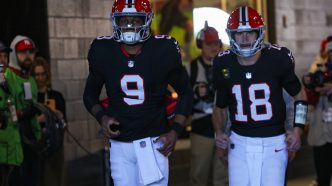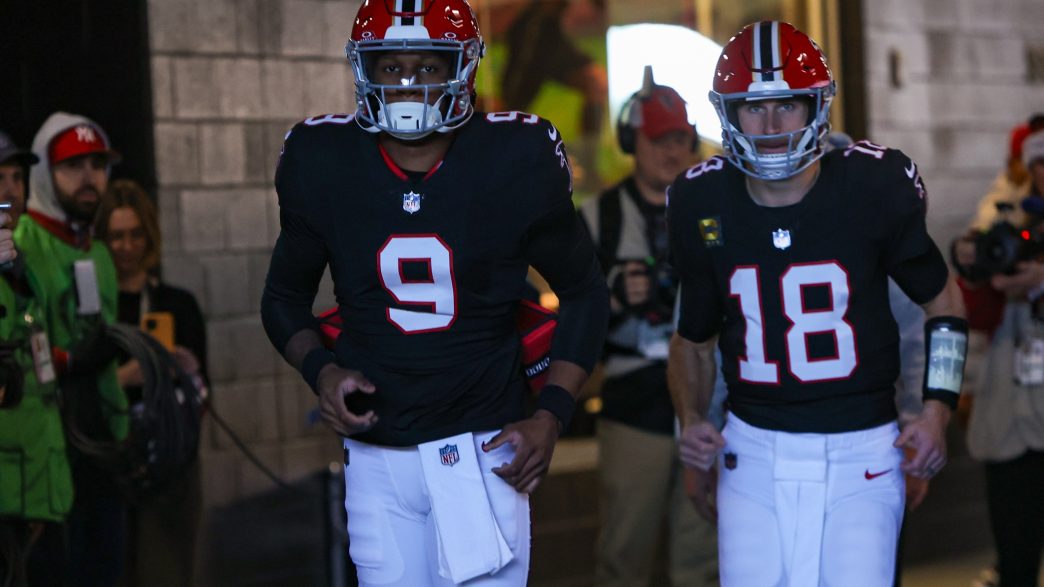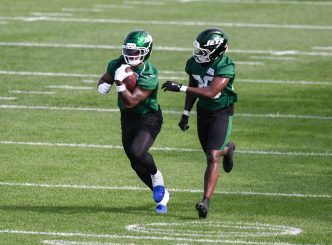Kirk Cousins recently opened up about his mixed feelings surrounding the Atlanta Falcons’ decision to draft quarterback Michael Penix Jr. with the No. 8 pick in the 2024 NFL Draft. This revelation came during an episode of Netflix’s “Quarterback,” where he candidly shared that had he known of the Falcons’ intentions, he might have chosen to re-sign with the Minnesota Vikings last offseason.
Cousins expressed feeling “a little bit misled” by the Falcons’ sudden pivot after signing him to a lucrative deal worth over $100 million guaranteed. When Atlanta opted to draft Penix, a player they envision as a future franchise quarterback, it blindsided both Cousins and many NFL observers. While he was aware that the Falcons might consider a quarterback, he certainly didn’t anticipate them selecting one as early as they did. The news of the Penix pick reached him only through a call from offensive coordinator Zac Robinson while the team was on the clock, catching him completely off guard.
Reflecting on his time in free agency, Cousins noted that had he received clearer communication regarding the Falcons’ quarterback plans, it could have significantly influenced his decision-making. “Certainly, if I had the information around free agency, it certainly would’ve affected my decision,” he said. He also acknowledged that his love for Minnesota and their ongoing interest in him made the possibility of leaving less appealing—especially if two teams were vying for a quarterback high in the draft.
The narrative took an unfortunate turn for Cousins when he led the Falcons to a promising 6-3 start before suffering a serious injury in Week 10 against the New Orleans Saints. A hard hit from defensive end Payton Turner resulted in significant discomfort, and Cousins quickly realized that this wasn’t just another bruise to play through. Despite this, he pushed himself, playing through the injury and hoping to solidify his position in the lineup rather than risk giving the young Penix an opportunity to shine.
As the season progressed, Cousins’ performance faltered, marked by an alarming stretch where he threw eight interceptions without a touchdown over four straight losses—the lowest point of his 13-year career. It wasn’t until the offseason that he truly comprehended the extent of his injury—a realization that made him reconsider his approach at the time.
Despite having technically recovered and appearing on the injury report only once after the hit, Cousins grappled with the decision of whether to rest and potentially lose his starting job to the rookie quarterback. “The information I had at the time, I made the best decision,” he recalled. His thoughts echoed the sentiments of veteran players like Drew Brees, who cautioned against letting a backup see the field, as opportunities can often lead to a permanent shift in dynamics.
Eventually, the Falcons made the call to bench Cousins in Week 16, allowing Penix to step into the starting role. While Penix performed admirably, leading the team in several games, the Falcons finished with a disappointing record, missing the playoffs altogether.
As the offseason unfolded, most pundits speculated that Cousins would be released; however, the Falcons surprised many by maintaining him on the roster and picking up his $10 million bonus. Falcons general manager Terry Fontenot emphasized that the veteran quarterback brings more value as a reliable backup to Penix, especially with a significant portion of his salary already committed.
Cousins, while candid about the difficulties of being benched, approached the situation with a maturity that speaks to his character. “It hurts to go into work, but you got to be an adult,” he said, recognizing the importance of focusing on the positives and maintaining a professional outlook despite the challenges. As he gears up for another training camp, the narrative around Cousins and his role within the Falcons presents an intriguing chapter, blending the complexities of NFL dynamics with the resilience of a seasoned competitor.








